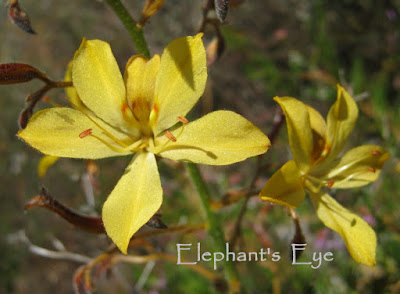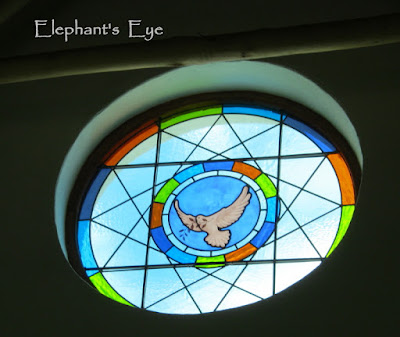Vondeling with Biodiversity and Wine and fire
by Diana
Studer
- gardening for biodiversity
in Cape Town, South Africa
In October 2013 we went to Vondeling near Wellington for the
WESSA (once was WWF South Africa) Annual Regional Meeting. Vondeling was a
proud supporter of the Biodiversity and Wine Initiative and is now a Conservation Champion
of WWF.
We had a brief walk along the edge of the vineyards. Diana
trailing along last as I revelled in new to me flowers.
Since the 2011 fire they have collected over 900 species on
the Paardeberg for their herbarium. Four species are endemic to the area: Babiana noctiflora (flowers at night), Erica hippuris, Oscularia paardebergenis (succulent in the Aizoaceae) and Serruria roxberghii (spiderhead protea).
South Africa’s vineyards are in the Cape Floral Kingdom (which includes fynbos
and Renosterveld). The CFK has over nine thousand species with many endemics.
In 2004 only 4% of the Renosterveld survived.
Evidence of their success in maintaining sustainable habitat
is a Cape
leopard caught on their camera trap.
The Hantam
is our only National Botanical Garden dedicated to conserving Renosterveld.
The Vondeling wedding chapel has enchanting windows. A round
one high up with a dove bearing an olive twig. Outside the chapel is a line of
olive saplings. Along the length of the chapel the windows are painted in trailing
vines.
I was encouraged to hear about young interns, and school
teachers – working with the next generation, and the next – wildflowers and
Cape leopards in our future.
Colin Bell, author of Africa’s Finest, told us - If we try to hug national parks all to ourselves, we lose it. If we reach out and share, like Botswana and Namibia, we can conserve nature for the future. His ‘responsible, sustainable tourism – what we have termed the Green Safari model. Viable, long-term partnerships are a winning scenario for wildlife, wildernesses and people.’ The ultimate green lodge.
Rocher
Pan cottages with composting toilets protecting the seasonal pan and
migrating birds, on our one day wish list - achieved in September last year!
Next on our wish list is to see the garden where Ernst Van
Jaarsveld (retired from Kirstenbosch) is now based at Babylonstoren. There
will be a Waterwise
Gardening workshop in February 2018.
Today's post is a distraction from two huge fires. The first
started at Sir Lowry's Pass and burnt along the slope between Gordon's Bay and
Steenbras Dam. Five
buildings lost. Animal Welfare evacuated. The second started at Red Hill.
Burnt across the mountain to Scarborough down to the sea. Then turned to Cape
Point Nature Reserve. Thanks
to our firefighters both fires are under control, and being monitored.
I invite you to join us at Elephant's Eye on False Bay.
Please subscribe as you prefer
via Feedly,
or Bloglovin,
Teal blue text is my links.
To read comments if you are in email or a Reader,
first click
thru to the blog)
Thanks for comments that add value. Maybe start a new thread
of discussion? BTW your comment won't appear until I've read it. No Google
account? Just use Anonymous, but do leave a link to your own blog. I would
return the visit, if I could...
I welcome comments on posts from the last 2 months.











The Green Safari Model seems to make good sense. That's similar to the model in many of our U.S. National Parks--welcoming tourists on a limited basis, so they appreciate and buy in to the importance and preservation of those habitats for future generations. :)
ReplyDeleteI love seeing all of the beautiful flowers that are native to your area. Saddened by the fires. We have had some terrible ones in the US this year too. xo Laua
ReplyDeleteI'm so sorry to hear that you're experiencing wildfires too, Diana. I hope they're a safe distance away from you and, for those in their path, I hope they're quickly extinguished.
ReplyDeleteWe only saw some smoke beyond the mountain ridge. Safely out today.
DeleteImpressive contrast to the grapes and the hillsides (chaparral to me!). That green safari tourism concept makes sense.
ReplyDeletesorry to hear about the fires, very scary. Managing tourism and protecting the environment is a challenge, it's good to hear about the green safari model.
ReplyDeleteI remember your wonderful eco -holiday.The Waterwise Garden workshop will be useful/ I was interested to read the garden Babylonstoren garden used to supply food for the old Sailing Ships. I'm so glad that the fires have now been put out.
ReplyDeleteVery interesting post as always...Your beautiful wild flowers always surprise me ( with delight). I hope the fires are not doing too much damage to the land as well as the people.I look forward to seeing the Babylonstoren garden, and the water wise garden workshop if you join that.
ReplyDeleteThe workshop is beyond my budget.
DeleteBut I do look forward to a garden tour, and lunch from the garden!
Very interesting and informative post. I went and read about the Renosterveld, now I know a little more than I did before. Thank you!
ReplyDeleteWe have been getting a good stretch of cool, mild weather, with rain up north, so we are hoping our fire season is over for several months.
Hoping for rain Monday / Tuesday . This is WAY too early for our fire season!
DeleteThis was interesting, I enjoyed coming along and seeing the pretty flowers.
ReplyDeleteAmalia
xo
The words of Colin Bell make so much sense.
ReplyDeleteI remember reading about the composting toilets in one of your previous postings, Diana. I would love one in my garden.
ReplyDeleteI would need a smallholding or a farm. Definitely seems a better option than a French drain or a septic tank if you are off-grid.
DeleteWhen we built our Camps Bay house, we had electricity and water, but we used a chemical camping toilet, and our neighbour had a soakaway ... until we had enough houses for sewerage to be financially viable.
How awful! Fires and water shortage. Are there more nature fires now because of climate change?
ReplyDeleteIt is a nasty combination of drought, and human carelessness, or even arson. Climate change gives us summer thunderstorms and a risk of lightning strikes.
DeleteFires terrify me, though I know many plants depend on fires for their propagation. Ultimately, the fires contribute to biodiversity. But I am upset when fires are started by humans through carelessness... and sometimes deliberately!
ReplyDeleteWith an added layer of horror when land owners don't bother to remove infestations of invasive aliens - which blaze up like fury!
DeleteWhat a delight it is to see all this bright light and colour. A breath of fresh air as winter approaches here in the UK.
ReplyDeleteLots of "new to me" flowers here. I'm especially smitten by the Watsonia -- love its shape and color. Is it in the lily family?
ReplyDeleteClose. It is the Iris family.
Delete